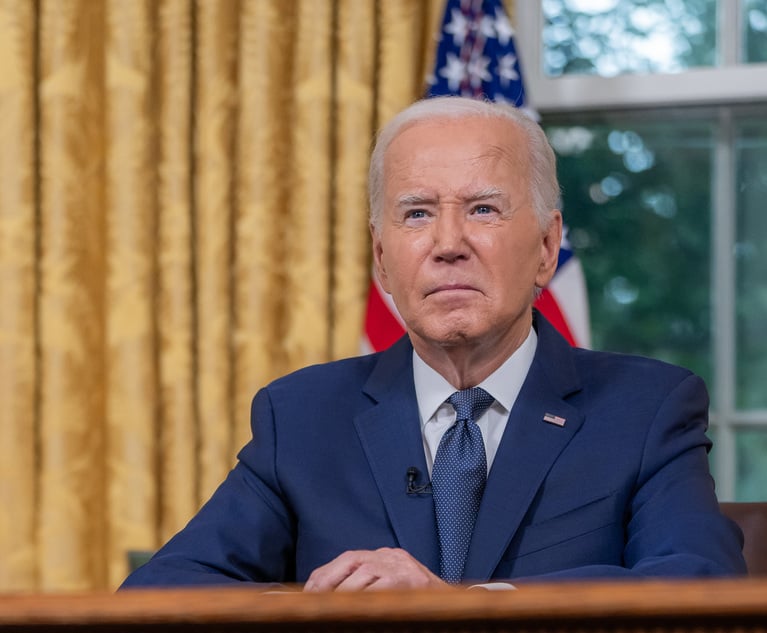 Judge Reggie Walton of the U.S. District Court for the District of Columbia. Photo by Diego M. Radzinschi/THE NATIONAL LAW JOURNAL
Judge Reggie Walton of the U.S. District Court for the District of Columbia. Photo by Diego M. Radzinschi/THE NATIONAL LAW JOURNALCoronavirus Challenges Force Slowdowns in DC FOIA Litigation
Lawyers for federal agencies say in court filings that staff are struggling to process Freedom of Information Act requests as they work remotely in response to the COVID-19 pandemic.
March 27, 2020 at 02:18 PM
7 minute read
Public records litigation making its way through Washington, D.C.'s federal court is slowing down as officers tasked with combing through the documents work from home or are cut off from accessing databases that house the records.
In court filings made in recent days in the U.S. District Court for the District of Columbia, lawyers representing several different federal agencies have laid out the difficulties Freedom of Information Act officers are facing in responding to court-ordered deadlines. Some are asking judges to adjust or stay deadlines, and the filings indicate that plaintiffs are agreeing to the temporary delays.
In at least one FOIA case, the Federal Bureau of Investigations asked a judge to stay proceedings altogether due to the pandemic, saying the agency is not processing any records requests. Lawyers said in a March 20 filing that "employees cannot telework and process records responsive to plaintiffs' FOIA requests because the systems that they work on are located on FBI's SECRET-level classified enclave."
In an attached declaration, FBI official Michael Seidel said telework "is not available" for employees processing the agency's FOIA requests due to the classified nature of the records, and the relevant staff are not considered "mission-critical" and were sent home. He said the office planned to reopen on March 30, but that "this situation remains fluid and will be regularly re-assessed as circumstances change."
"As of March 17, 2020, no further production of records pursuant to FOIA will be made, whether those productions are in relation to requests in litigation or at the administrative stage," Seidel wrote. "This includes responses to FOIA consultation requests or referral from other agencies to the FBI."
Judge Reggie Walton on Monday denied the request to stay the case entirely, but did vacate all of the FBI's production and processing deadlines in the case. He asked the parties to confer and file a joint status report by April 13 about further proceedings in the case.
In a lawsuit seeking records on Justice Brett Kavanaugh, Justice Department lawyers representing the National Archives said in a filing Monday that some records are housed in the George W. Bush Presidential Library, "which closed to the public on March 13, 2020, due to COVID-19."
"Unfortunately, due to the highly sensitive nature of the presidential records stored in NARA's Electronic Records Archives (ERA) system, the ERA system was configured to only work onsite and cannot be accessed by employees while teleworking," the filing reads. "And all of the relevant employees are currently teleworking, consistent with recent OMB guidance to maximize telework to the greatest possible extent. Accordingly, the library is currently not processing any new records responsive to plaintiffs' request."
The parties said in the joint status report that they agreed the archives wouldn't process any more documents for the next 30 days, and will meet at that time to determine what the next steps should look like.
The report also said that the Justice Department's Office of Legal Counsel is also facing difficulties in processing records due to the pandemic. Rather than ask the case to be paused, they asked a judge to adjust the deadlines so they would process 1,200 records over the next three months, rather than 400 records each month.
"At least at this time, most OLC FOIA processing is continuing in a remote-telework environment, but the process of reviewing and clearing monthly responses is necessarily made substantially more difficult. And the process of engaging in necessary consultations with other entities within the Executive Branch is much less predictable than under ordinary circumstances, as each agency is affected in different ways," the filing reads.
The State Department has also said in several lawsuits that its ability to process FOIA requests is severely curtailed.
In a joint status report filed in an American Oversight suit seeking records about Vice President Mike Pence's contacts with Ukrainian President Volodymr Zelensky in September 2019, DOJ lawyers said the State Department is implementing telework guidelines to safeguard employees from COVID-19.
"As a result, significant portions of department personnel are teleworking, and many department records are stored or must be processed on systems to which personnel do not currently have remote access. Accordingly, the department's search and processing capabilities are seriously diminished," the filing reads.
In a declaration filed in several other State Department public records suits, official Eric Stein, who is responsible for responding to FOIA requests at the agency, said the department's "FOIA processing capabilities are being seriously compromised by the COVID-19 pandemic."
"In short, because of the grave impact of the COVID-19 pandemic that has limited Executive Branch work in the office workplace to mission-critical functions, the inaccessibility from outside of department worksites of the systems the department uses to process FOIA cases, and the department's paramount concerns for the safety of its employees, the department's ability to process documents in response to the request in this case has been greatly diminished," Stein wrote. "Accordingly, the department respectfully seeks a 60 day stay."
Other federal agencies have also said in court filings that they too are feeling the strain of the pandemic, and that it's impacting their ability to process requests.
In another American Oversight lawsuit seeking DOJ records tied to the U.S.'s hold on Ukrainian aid and President Donald Trump's contacts with Zelensky, lawyers for the Justice Department's National Security Division said in a filing Wednesday that the division "will endeavor" to make a final response to the request by April 30.
"However, due to challenges relating to the COVID-19 pandemic which have limited NSD's ability to process responsive paper records, NSD anticipates that that schedule may potentially end up not being feasible. The parties are continuing to confer regarding this issue," the joint status report reads.
"Furthermore, due to the current national emergency relating to the COVID-19 pandemic, the parties have agreed to informally discuss the issue of consultations based on each agency's capabilities as the situation continues to unfold," the lawyers wrote.
The D.C. docket is flooded with FOIA litigation targeting the federal agencies in the court's jurisdiction. But as the coronavirus pandemic triggered public health restrictions, Chief District Judge Beryl Howell ordered civil and criminal proceedings halted until April 17, unless an individual judge orders otherwise. Criminal trials are delayed until May 11.
Judges have postponed or vacated hearings in the public records cases, with some saying they'll now rule on briefs or transition to phone conferences.
Attorneys haven't stopped filing FOIA litigation in the D.C. federal court during the pandemic, including at least one seeking records about the Trump administration's efforts to address the coronavirus.
Read more:
This content has been archived. It is available through our partners, LexisNexis® and Bloomberg Law.
To view this content, please continue to their sites.
Not a Lexis Subscriber?
Subscribe Now
Not a Bloomberg Law Subscriber?
Subscribe Now
NOT FOR REPRINT
© 2024 ALM Global, LLC, All Rights Reserved. Request academic re-use from www.copyright.com. All other uses, submit a request to [email protected]. For more information visit Asset & Logo Licensing.
You Might Like
View All
3rd Circuit Strikes Down NLRB’s Monetary Remedies for Fired Starbucks Workers

Longtime Baker & Hostetler Partner, Former White House Counsel David Rivkin Dies at 68
2 minute read
After 2024's Regulatory Tsunami, Financial Services Firms Hope Storm Clouds Break
Trending Stories
- 1Legal Issues to Watch in the US Appeals Courts in 2025
- 2Ex-MoviePass CEO Submits to Ban, Settling SEC Allegations
- 3Baker McKenzie, Jones Day, Reed Smith Make 2025 Partner Promotions
- 4Key Securities Issues Need a Look From SCOTUS, Lawyers Say
- 5In-House Moves of the Month: Boeing Loses Another Lawyer, HubSpot Legal Chief Out After 2 Years
Who Got The Work
Michael G. Bongiorno, Andrew Scott Dulberg and Elizabeth E. Driscoll from Wilmer Cutler Pickering Hale and Dorr have stepped in to represent Symbotic Inc., an A.I.-enabled technology platform that focuses on increasing supply chain efficiency, and other defendants in a pending shareholder derivative lawsuit. The case, filed Oct. 2 in Massachusetts District Court by the Brown Law Firm on behalf of Stephen Austen, accuses certain officers and directors of misleading investors in regard to Symbotic's potential for margin growth by failing to disclose that the company was not equipped to timely deploy its systems or manage expenses through project delays. The case, assigned to U.S. District Judge Nathaniel M. Gorton, is 1:24-cv-12522, Austen v. Cohen et al.
Who Got The Work
Edmund Polubinski and Marie Killmond of Davis Polk & Wardwell have entered appearances for data platform software development company MongoDB and other defendants in a pending shareholder derivative lawsuit. The action, filed Oct. 7 in New York Southern District Court by the Brown Law Firm, accuses the company's directors and/or officers of falsely expressing confidence in the company’s restructuring of its sales incentive plan and downplaying the severity of decreases in its upfront commitments. The case is 1:24-cv-07594, Roy v. Ittycheria et al.
Who Got The Work
Amy O. Bruchs and Kurt F. Ellison of Michael Best & Friedrich have entered appearances for Epic Systems Corp. in a pending employment discrimination lawsuit. The suit was filed Sept. 7 in Wisconsin Western District Court by Levine Eisberner LLC and Siri & Glimstad on behalf of a project manager who claims that he was wrongfully terminated after applying for a religious exemption to the defendant's COVID-19 vaccine mandate. The case, assigned to U.S. Magistrate Judge Anita Marie Boor, is 3:24-cv-00630, Secker, Nathan v. Epic Systems Corporation.
Who Got The Work
David X. Sullivan, Thomas J. Finn and Gregory A. Hall from McCarter & English have entered appearances for Sunrun Installation Services in a pending civil rights lawsuit. The complaint was filed Sept. 4 in Connecticut District Court by attorney Robert M. Berke on behalf of former employee George Edward Steins, who was arrested and charged with employing an unregistered home improvement salesperson. The complaint alleges that had Sunrun informed the Connecticut Department of Consumer Protection that the plaintiff's employment had ended in 2017 and that he no longer held Sunrun's home improvement contractor license, he would not have been hit with charges, which were dismissed in May 2024. The case, assigned to U.S. District Judge Jeffrey A. Meyer, is 3:24-cv-01423, Steins v. Sunrun, Inc. et al.
Who Got The Work
Greenberg Traurig shareholder Joshua L. Raskin has entered an appearance for boohoo.com UK Ltd. in a pending patent infringement lawsuit. The suit, filed Sept. 3 in Texas Eastern District Court by Rozier Hardt McDonough on behalf of Alto Dynamics, asserts five patents related to an online shopping platform. The case, assigned to U.S. District Judge Rodney Gilstrap, is 2:24-cv-00719, Alto Dynamics, LLC v. boohoo.com UK Limited.
Featured Firms
Law Offices of Gary Martin Hays & Associates, P.C.
(470) 294-1674
Law Offices of Mark E. Salomone
(857) 444-6468
Smith & Hassler
(713) 739-1250











